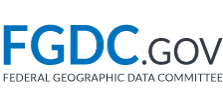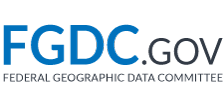Geospatial Standards Organizations
- ISO, the International Organization for Standardization, is a global independent, non-governmental organization made up of members from national standards bodies of 165 countries. Standards development is carried out by technical committees such as ISO Technical Committee 211.
- ISO Technical Committee 211 (ISO TC 211), Geographic information/Geomatics, is concerned with standardization of digital geographic information. It aims to establish a structured set of standards for information concerning objects or phenomena that are directly or indirectly associated with a location relative to the Earth.
- ANSI, the American National Standards Institute, is the U.S. member body of ISO. ANSI accredits standards developers, certification bodies and technical advisory groups (TAGs) to both ISO and the International Electrotechnical Commission (IEC).
- The InterNational Committee for Information Technology Standards (INCITS) is accredited by the American National Standards Institute (ANSI) to develop standards for Information and Communications Technologies (ICT). The INCITS program of work is segmented into projects, each of which are related to the development of a specific Standard, Technical Report (TR), or study area. Each project is assigned to a Technical Committee, Task Group, or Study Group.
- INCITS Technical Committee L1, Geographic Information Systems adopts or adapts information technology standards and develops standards for creating, defining, describing, and processing digital geographic data. INCITS Technical Committee L1 is the means by which the FGDC and its member agencies participate in domestic and international geospatial standardization activities. It serves as the U.S. TAG to ISO Technical Committee 211.
- The Open Geospatial Consortium (OGC) is a consortium aimed at growing interoperability for technologies involving spatial information and location. OGC holds a Class A Liaison status with ISO/TC 211, and ISO/TC 211 has an ex-officio membership on the OGC Planning Committee.
- The Geospatial Intelligence Standards Working Group (GWG) provides the forum for the coordination of GEOINT (GEOspatial INTelligence) standard activities. It is led and chaired by the National Geospatial-Intelligence Agency (NGA)'s National Center for Geospatial Intelligence Standards (NCGIS). It participates in both Department of Defense (DoD) and Intelligence Community (IC) standards governance processes.

Other standards organizations
- ASTM International (formerly American Society for Testing and Materials) is an international standards organization that develops and publishes voluntary consensus technical standards for a wide range of materials, products, systems, and services. It is an ANSI-accredited standards development organization.
- The National Emergency Number Association (NENA) is a professional organization solely focused on 9-1-1 policy, technology, operations, and education issues. It is an ANSI-accredited Standards Developer. It has vetted and approved several OGC standards for use in NextGen 9-1-1.
- Object Management Group (OMG) is a not-for-profit consortium that produces and maintains computer industry specifications for interoperable enterprise applications, including specifications for Unified Modeling Language (UML), the conceptual schema language used for ISO TC 211 standards and OGC standards.
- The World Wide Web Consortium (W3C) develops interoperable technologies (specifications, guidelines, software, and tools) to lead the Web to its full potential.
- The Organization for the Advancement of Structured Information Standards (OASIS) drives the development, convergence and adoption of e-business standards. OASIS produces worldwide standards for security, Web services, XML conformance, and more.
- The American Society of Photogrammetry and Remote Sensing (ASPRS) has a home page for its Standards Committee.
- The Internet Engineering Task Force (IETF) is a large open international community of network designers, operators, vendors, and researchers concerned with the evolution of the Internet architecture and the smooth operation of the Internet." Geospatial standards are often dependent on other industry standards such as IETF.

